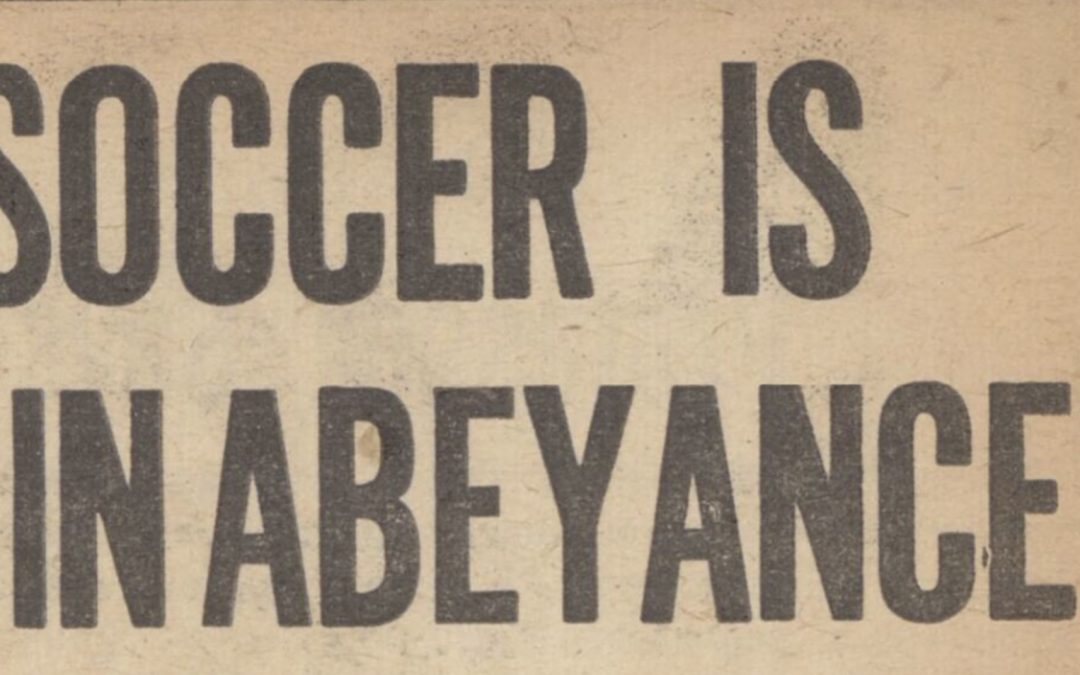BY Vince Cooper
In recent times the Coronavirus pandemic has seen us go through a period of no football at all followed by a significantly longer one of football without fans.
The 1939-40 season was the last one to be suspended, and it was eventually abandoned, due to somewhat different circumstances.
Amazingly, just six days before the season started and with talk of the impending war dominating the media, an athletics team representing Great Britain lost to Germany in Cologne with a crowd of over 60,000 present.
After a week of ‘Jubilee Fund’ games the league season began on 26 August with Europe already preparing for conflict. Prime Minister Neville Chamberlain and his government were frantically, and ultimately fruitlessly, trying to avoid conflict, with Britain’s Ambassador to Berlin, Sir Neville Henderson, flying out to Germany to deliver the country’s reply to Hitler’s peace proposal to solve what had become known as ‘The Danzig Problem’.
The proposal included the insistence that Britain should withdraw it’s guarantee to support Poland in any conflict and that the city of Danzig (now know as Gdańsk) be immediately incorporated into the Reich.
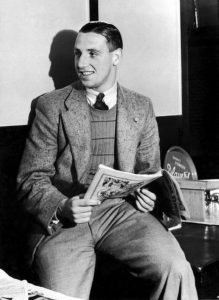
Tommy Lawton of Everton
On the football front, and with numbers on shirts compulsory for the first time in league matches, champions Everton kicked off at home to Brentford. A crowd of 25,000 saw prolific number-nine Tommy Lawton give the hosts a first-half lead but the West Londoners fought back and grabbed a draw thanks to a second period 35-yard piledriver from inside-forward Percy Saunders.

Percy Saunders
Saunders would never play an ‘official’ match for the Bees. Born in Sussex in 1916, he started his footballing career with Sunderland, joining in 1936 and spending three years at Roker Park which included the title-winning season of 1936-37, although he didn’t make any appearances in that campaign.
Percy moved to Griffin Park in the summer of 1939 after 26 appearances and six goals for the Black Cats, and made his debut in a 5-1 Jubilee Fund defeat by Chelsea where he missed a penalty. He then appeared in two of The Bees three matches in the the ultimately abandoned season.
On the declaration of war Saunders enlisted and joined the 18th Divisional Workshops, Royal Army Ordnance Corps. Sent to the Far East he was part of the struggle to defend Malaya and Singapore against the Japanese.
Eventually the resistance was overcome and British troops fled to India. Saunders boarded the SS Roseboom which had diverted to the Indonesian island of Emmahaven (now known as Padang) to collect civilians and soldiers and transport them to Bombay (Mumbai).
On 1 March 1942 the Roseboom was spotted by a Japanese submarine which fired its torpedos at the ship, sinking it. There was a single lifeboat left after the attack and of the 215 on board only a handful survived with Percy Kitchener Saunders was one of those who lost his life.

Bryn Jones
The biggest crowd of a total opening day league attendance of over 600,000 was the 45,000 at Molineux to see the hosts, runners-up to Everton in the previous campaign, take on Arsenal who included former Wolves star and British transfer record holder Bryn Jones in their line up and they saw a thriller although they were lucky to see a game at all.
The train carrying the Arsenal team to Wolverhampton wobbled and left the line near Coventry. Fortunately it jumped back onto the line almost immediately and nobody was hurt although boss George Allison reported that it was a ‘narrow squeak’ and that the players were badly shaken by the incident.
In a match described by Peter Wilson in the Sunday Pictorial as one of: ‘grand cut and thrust with no quarter asked but no dirty play,’ Wolves took the lead through a Dicky Dorsett half-volley then Alf Kirchen, who like Dorsett joined the R.A.F. when hostilities broke out, equalised for The Gunners with what Wilson called; ‘one of the most astonishingly angled shots I have ever seen,’ so the teams went into the break all-square.
After the interval 19-year-old Reg Lewis put Arsenal ahead after a ‘ball-on-a-string pass’ from Cliff Bastin but Wolves fought back and a close-range Dennis Westcott goal left the match all-square.
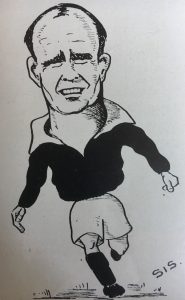
Johnny Carey of Manchester United
There were joint top scorers in the season’s first round of matches. Manchester United got goals from Billy Wrigglesworth, Johnny Carey, Stan Pearson and Billy Bryant as they put four past Grimsby without reply at Old Trafford whilst Stoke City got two from Clement Smith and one each from Frank Soo and Tommy Sale whose 4-0 win over Charlton at The Victoria Ground was inspired by an outstanding display from Stanley Matthews. The home team were without both their first and second-choice goalkeepers who had been called up for military service but third-in-line Pat McMahon, formerly of West Ham and Wrexham, had little to do after the Addicks lost Don Walsh to a leg injury with just 15 minutes played.
Chelsea recorded a 3-2 home win over Bolton Wanderers but the ‘Weekly Despatch’ correspondent was less than impressed with the performance of the home team who finished with 10 men after Jimmy Argue left the pitch late on with a head injury following a collision The report stated; “Admittedly Chelsea won, but if Bolton had showed a reasonable amount of restraint in front of goal the home team would have been lucky to get away with one point let alone two”.
Elsewhere newly-promoted Sheffield United recorded a win against Liverpool at Bramall Lane but fellow newcomers Blackburn Rovers were unable to match the Blades falling 2-1 to cup holders Portsmouth at Fratton Park.
Farther down the league 2nd Division Leicester City seemed to be coasting to victory against Manchester City when 3-1 up late in the second half. the Sky Blues fought back with two goals in four minutes to level but there was still time for Leicester to grab a winner.
There was an even more exciting encounter in the 3rd Division (South). At Field Mill, Mansfield Town led Crystal Palace 3-1 at half time. Final score? 5-4 to Palace.
During the midweek following the opening fixtures there was another round of matches with tensions continuing to grow and the prospect of a war declaration seemingly growing by the day. The Germans were refusing to budge on any of the terms Hitler had set out in his original peace proposal and Great Britain went ahead with preparations for the seemingly inevitable conflict.
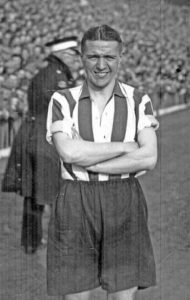
Jock Dodds
Monday’s matches saw champs Everton get their season on track with a 2-1 win at Aston Villa with Tommy Lawton again finding the net, Brentford succumbing to a 2-1 defeat at Blackpool who were following up an opening day win at Huddersfield and whose Ephraim ‘Jock’ Dodds made one and scored the other, and Stoke failing to follow up their opening day success, losing 2-1 at home to Bolton Wanderers.
On Tuesday Prime Minister Chamberlain spoke in the House of Commons and stated that: “The issue of peace or war is still undecided” although the Government insisted that the country’s obligations to Poland would be met.
The only 1st Division match on Tuesday saw a crowd of 15,000 at Blundell Park watch a dull goalless draw between hosts Grimsby and Wolves.

Stan Cullis leads Wolves out
Winger Billy Wardle, recently signed from Manchester City, stood out for the home team whilst Stan Cullis was in excellent form for the visitors.
Cullis had already made his views on Hitler’s facist movement clear a year before. He travelled to Berlin as part of the England team to face Germany but when informed before the match by F.A, Secretary Stanley Rous that ambassador Henderson had made it clear that the team would be expected to give the Nazi salute before kick-off responded with the comment; ‘count me out’ and was left out of the line-up.
Wednesday saw war edging ever closer with Germany setting up a ‘Council of Defence’ and Sir Neville Henderson personally delivering Britain’s reply to Hitler’s latest proposal, a retort that was said to show ‘No weakening or change in British policy’. Meanwhile trenches were being dug across the country with anti-aircraft guns put in place.
The big winners in Wednesday night’s football action were Liverpool who beat Middlesbrough 4-1 at Anfield. Phil Taylor grabbed two goals. Taylor would later be converted to wing half, would skipper the side playing over 300 games and spent more than three years as manager in the 1950s before giving way to Bill Shankly. South African Harman Van den Bergh and Jack Balmer were also on the scoresheet.
There were also a home win for Arsenal who squeezed past Blackburn Rovers thanks to a Cliff Bastin penalty, whilst Derby County, Charlton Athletic and Huddersfield Town all recorded their first wins of the season following opening day defeats. Chelsea and Manchester United fought out a 1-1 draw at Stamford Bridge with both goals coming inside a minute just before half time and the match at Deepdale between Preston North End and Sheffield United finished goalless.
Luton Town recorded a 3-0 2nd Division win at Bradford thanks to a Hugh Billngton hat-trick. Billington had scored twice in the opening-day win over Sheffield Wednesday so was taking his tally to five in two matches.
As September started the British fleet was being mobilised, the evacuation of children from London had started and phone calls from the U.K. to Europe were suspended. War seemed inevitable with Germany’s latest ‘offer’ to Poland immediately rejected.
Although some teams were now being affected by Army call-ups and some kick-off times, particularly in the South were altered due to evacuation plans, it was confirmed that a full programme would go ahead at the weekend.
By Saturday it was clear that Britain would soon be declaring war on Germany, with an ultimatum issued on Friday ordering the Germans to immediately withdraw troops from Poland going unheard. They would in fact do so a day later, but there was time for one more round of matches.
Other sports were already being affected with Greyhound, Speedway and Cricket all abandoned in different parts of the country, but despite players being lost to call-ups football pressed on, although only for one more week.
Blackpool sat on top of the 1st Division table heading into the day’s fixtures and they confirmed their position, maintaining their 100% record with a 2-1 win over Wolves in front of 20,000 fans.
The win came courtesy of two goals from opening-day hero ‘Jock’ Dodds. The Scottish international had joined the Seasiders in March with the club splashing out £10,000, at the time the second biggest transfer fee ever paid, to bring him from Sheffield United for whom he had appeared in the 1936 FA Cup final.
Dodds was given a salary of £6 per week with a further £2 for every first-team appearance. He was extremely prolific during the war years for the Tangerines scoring over 200 goals whilst also making eight appearances for his country in wartime internationals finding the net nine times.
When peace finally returned Dodds spent a short time with Shamrock Rovers before joining Everton where he replaced Tommy Lawton. A record of 36 goals in 55 league appearances with the Toffees was followed by a move back to Lincoln City where he had spent some time early in his career.
After hanging up his boots in 1950 Dodds started recruiting players to play in Colombia which, at the time, was not recognised by FIFA causing a later rescinded FA ban. When he passed away in 2007 he was, at 91, the oldest surviving cup finalist.
The attendance at Bloomfield Road was matched at Highbury where a four-timer from Ted Drake helped Arsenal to a 5-2 win over Sunderland.

Ted Drake and Charlton ‘keeper Sam Bartram in the R.A.F.
Drake, who would later join the R.A.F., was joined at the top of the individual scoring charts by Tommy Lawton whose brace in Everton’s 2-2 draw at Blackburn took his tally to four.
Lawton’s career was affected as much as any by the conflict. Despite losing the years from when he was 21 to 27 he finished his career with 231 goals in 390 league matches, along with 22 in 23 England starts and another 24 in 23 wartime internationals. Those figures might well have been doubled without the hostilities.

Cyril Done of Liverpool
Liverpool hosted Chelsea and gave a debut to 18-year-old centre-forward Cyril Done who had only played two practice matches and one Central League game at the position. The youngster headed the only goal of the game and would go on to be extremely prolific for the club during wartime matches but when football restarted although he was only picked sporadically. This included 10 goals in 17 matches during his team’s title win in 1946-47.
Eventually sold to Tranmere Rovers, Done then moved on to Port Vale where he came back to haunt his first team grabbing all the goals in a 4-3 win over the Reds in 1955.
There were some big scores farther down the league with 2nd Division Newcastle netting eight against Swansea and fans at the Hawthorns seeing two hat-tricks as Spurs got the better of West Brom 4-3. Meanwhile Bournemouth found the net ten times without reply in a 3rd Division (South) thrashing of Northampton Town.
20-year-old full-back Joe Carr played in all of Sheffield United’s three matches helping his team to two wins and a draw. Having made 24 appearances during the previous campaign, Carr certainly looked like a highly-promising player. In October 1939 he joined the Army, serving in the Royal Artillery and lost his life at Dunkirk in May 1940.
Joe Carr and Percy Saunders were just two of over 70 professional footballers who lost their lives while serving their country during the conflict. There were over 20 German players killed along with footballers from more than 20 other countries. Scores more were injured and, of course, the war cost many top players six prime years of their careers.
Britain officially declared war on Germany at 11am on Sunday 3 September. A statement was issued that; “Sport gatherings and all gatherings for purposes of entertainment and amusement whether outdoor or indoor which involve large numbers of people congregating together are prohibited until further notice.”
An emergency meeting of the Football League was held in Crewe on Wednesday 6 September after which Secretary Fred Haworth announced that all league competitions had been cancelled.
Despite this football did continue, first with some friendlies and later with leagues run on a regional basis with all matches unofficial as were internationals.
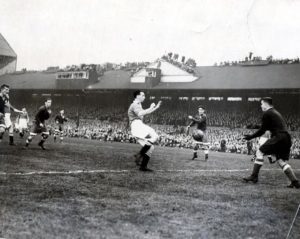
Tommy Lawton in action for Chelsea against Moscow Dynamo in 1945
The FA Cup was played in 1945-46 but fans had to wait until 31 August 1946 to welcome back league football. The fixtures were a repeat of those played to launch the aborted 1939-40 season and this time just under 1 million fans showed up. There were 61,464 at Stamford Bridge to watch Chelsea overcome Bolton Wanderers 4-3 helped by a brace from newcomer Tommy Lawton who had moved south from Everton for £14,000 in November 1945 just before the famous match with Moscow Dynamo, and two more from Dickie Spence. Bolton’s three in reply included two from debutant Nat Lofthouse.
Over 50,000 were present at Molineux to see Wolves thrash Arsenal 6-1 with Jesse Pye hitting a debut hat-trick and 53,000 attended at Roker Park where Sunderland edged past Derby County 3-2.
It was a long wait but fans clearly welcomed football back with open arms.
The interruption puts the coronavirus delay into perspective, both in terms of the amount of time the game was delayed and the reasons behind it. Let’s just hope players are never forced off the pitch – for either reason – again.

